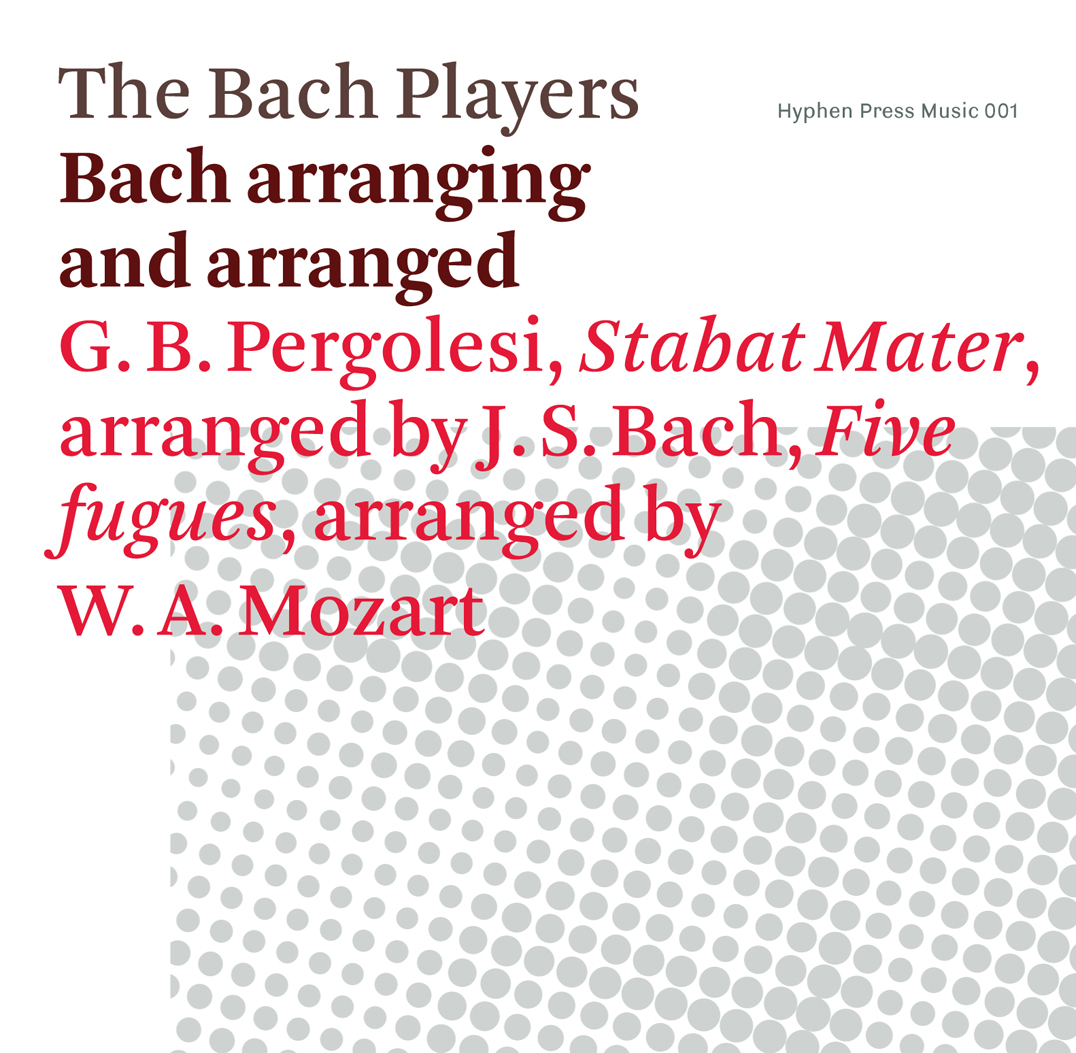[HPM 001]
What happens when great composers arrange each other’s works? J.S. Bach gave Pergolesi’s Stabat Mater a new text and a new viola part, making a fresh piece that speaks both of Germany and Italy. This performance features singers Rachel Elliott and Sally Bruce-Payne.
Mozart gave string players the pleasure of playing fugues from the Well-tempered Clavier II – fresh arrangements by The Bach Players complete the set of all the four-part fugues from this work.
The music
J.S. Bach (1685–1750): Fugues from the Well-tempered Clavier II, arranged for string quartet by W.A. Mozart (1756–91), K 405, c. 1782
No. 1 in C minor [BWV 871]
No. 5 in D major [BWV 874]
No. 2 in E flat major [BWV 876]
No. 4 in D minor [BWV 877]
No. 3 in E major [BWV 878]
G.B. Pergolesi (1710–36): Stabat Mater in F minor, arranged by J.S. Bach on the text of Psalm 51: ‘Tilge, Höchster, meine Sünden’, BWV 1083, c. 1746
J.S. Bach, Fugues from the Well-tempered Clavier II, arranged for string quartet
A minor [G minor, BWV 8201;885]+
G major [A flat major, BWV 8201;886]+
C minor [B flat minor, BWV 891]^
C major [B major, BWV 892]+
+ arranged by Rodolfo Richter for The Bach Players
^ arranged by W.A. Mozart, completed by Abbé M. Stadler
The musicians
The Bach Players:
Rachel Elliott soprano
Sally Bruce-Payne alto
Nicolette Moonen violin & director
Rodolfo Richter violin
Huw Daniel violin
Sophie Barber violin
Anne Schumann viola
Alison McGillivray cello
Elizabeth Bradley double bass
Pawel Siwczak organ
Recording & production
Producer: Roy Mowatt
Recording engineer: Alan Mosley
Edited & mastered: Nicholas Parker
Recorded at St Michael’s Church, Highgate, London, 23 to 25 June 2008
Presentation
A 16-page accompanying booklet includes an essay by the composer Hugh Wood reflecting on the phenomenon of arrangement, a discussion by the musicologist Yo Tomita of Mozart’s arrangements of Bach’s fugues, and an interview with The Bach Players’ Nicolette Moonen. The text of ’Tilge, Höchster, meine Sünden’ is given with an English translation. Photographs of the recording session, by Martin Argyroglo, are interspersed. The CD and booklet are held in a packet made of card and without any plastic.
Reviews
The quartet, hived off from the sensitive period strings of The Bach Players, performs with warm expressivity nine fugues from Bach’s 48 as set by Mozart, who showed his genius in recognising that of another. However, central to this beautifully put-together disc is Bach’s exquisite arrangement of Pergolesi’s Stabat Mater. Bach sets to it a German version of Psalm 51, ‘Tilge Höchster meine Sünden’, which is sung here by soprano Rachel Elliott and alto Sally Bruce-Payne, sparring delicately over the velvet accompaniment of the full ensemble. Bach improves Pergolesi – and Mozart’s enclosing take is due homage.
RJ, Classic FM, February 2009
The main piece in this interesting programme is Bach’s own arrangement, or parody of Pergolesi’s celebrated Stabat Mater for soprano and alto voices with strings and continuo. Pergolesi completed it in 1735, shortly before his death in the following year, and Bach produced his version a decade or two later. The German-rhymed paraphrase is by an unidentified author and Bach, of necessity, had to make many small adjustments to accomodate the new text. Nevertheless, in the main he remained faithful to Pergolesi’s original, though enriching the texture with an independent viola strand.
The performance is a delight from start to finish. All too often this music is spoilt by the uneven results and almost invariable rivalry stemming from the partnership of a soprano with a counter-tenor. Neither Rachel Elliott nor Sally Bruce-Payne is over-assertive or over-eager to take centre stage, much preferring to preserve the penitential context of the piece and the ethereal beauty of the music. Both voices strike my ears as about ideal as you could get. Their lightly articulated phrasing, stylish decoration and, where occasion requires, even partnership are a constant delight. Indeed, I find their sublime duet ‘Denn du willst kein Opfer haben’ outstandingly sensitive in matters of expression and here, as throughout, they are accompanied by gently complementary string playing.
In short, no rival version that I have heard on disc, and there are several, matches this one. Well-judged tempos and an ideal recorded sound set the seal on a particularly satisfying issue. To hell with the credit crunch, go and buy it, at once.
Nicholas Anderson, International Record Review, February 2009
